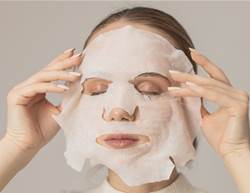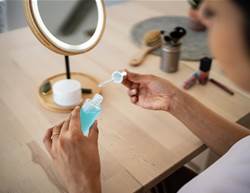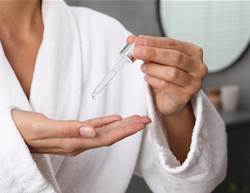If you’ve ever dealt with dry, flaky skin, you know just how frustrating it can be. Your face looks older than it is, your makeup looks cakey, and products that didn’t burn before suddenly irritate your skin no end. No matter how much moisturiser you slather on, you still manage to feel like a crocodile by the end of the day. What gives?
You simply may have inherently dry skin that gets worse during the wintertime, thanks to the lower humidity, frigid temps, and harsh wind, says dermatologist Dr Rajani Katta.
And believe it or not, the products you think are helping could actually be making things worse. Not sure what to do about it? We asked dermatologists to break down what could be causing the irritation-and exactly what you can do to heal your dry, flaky skin ASAP.
First, what causes dry, flaky skin on your face?
Weather changes
There’s a reason winter wreaks havoc on your complexion. “When the air is dry and cold, more water evaporates on the surface of your skin. This leads to flaking because the top layer of the skin gets dried out,” says dermatologist Dr Angela Lamb, especially if your skin tends to be on the dry side already. “Skin cells are made up of proteins that get dried out when they are not hydrated. Think about a dried flower or a dried piece of fruit.”
Contact dermatitis
“I frequently see allergic reactions to skin care or hair care products, and these can result in scaly, red, itchy patches,” says Dr Katta. This reaction is a form of eczema: a cluster of skin conditions resulting in dry, flaky patches known as allergic contact dermatitis. These flare-ups happen when the skin becomes sensitive to a certain substance and is exposed to it more than once. It usually takes two to three days before the allergic rash begins to form.
Irritant dermatitis is another form of contact dermatitis that is becoming more common, says Dr Katta. This often results in a more immediate reaction (that stiff, tight feeling) and is caused by products such as scrubs, exfoliating cleansers, masks and acne medications that contain ingredients that may be too strong for your skin type.
A common trigger for both? Fragrance-including natural (essential oils, for example) and synthetic (good ol’ perfume) varieties. Cosmetics, sunscreens, medications, and even your soap or detergent can also be culprits.
Seborrheic dermatitis
Seborrheic dermatitis is another form of eczema characterised by red, itchy, flaking skin in or between your eyebrows, in the folds next to your nose, or on your scalp (hello, dandruff!). Experts believe it is linked to an irritating yeast found in the oils of skin, which causes an immune system reaction.
“Although your skin might appear to be dry, the flaking is actually due to inflammation, and it’s often seen in people with oily skin,” says Dr Katta. Flare-ups become more common during cold, dry months.
Psoriasis
Psoriasis and eczema often look similar, but they aren’t the same thing. Psoriasis is an autoimmune condition, meaning it’s not caused by irritants. What’s more, it often results in patches that look scaly and raised. It does not tend to be as weather dependent, but if you have chronically dry, flaky, or rash-plagued skin, see your doc for a proper diagnosis, says Dr Lamb.
How to get rid of flaky skin on your face
To get rid of dry, flaky skin, you have to nail down the source. If your flakes are mild and seem to stem from weather changes or inherent dryness, try the following dermatologist-approved tips to smooth, hydrate, and heal your complexion.
If your skin doesn’t improve with any of these measures, see your dermatologist to ensure a proper diagnosis. From there, her or she can help determine the best treatment options, which may include prescription medications.
Opt for a gentle cleanser
“If your skin is very dry, I recommend using a gentle, hydrating cleanser,” says Dr Katta. “There are also soap-free cleansers available that cleanse without drying out the skin.”
Look for fragrance-free, creamy formulas that tend to feel more like a silky moisturiser when you’re washing your face. Ingredients like hyaluronic acid and ceramides will offer an extra dose of hydration as you cleanse.
Exfoliate: but be gentle
If you’re simply experiencing flaking due to dry, sensitive skin, less is more! Exfoliating can be an effective way of sloughing off dead skin cells that lead to flaking-but you want to be careful. The key is to be gentle with your skin, says Dr Lamb, otherwise you may cause further dryness and irritation.
Instead of using harsh scrubs, opt for a microfiber towel (gently buff in circular motions) to exfoliate after cleansing. Stick to exfoliating only two to three times per week, and always follow with moisturiser.
In general, Dr Katta recommends avoiding the following products until your symptoms improve:
- Chemical exfoliants, such as salicylic, glycolic, or other alpha hydroxy acids
- Face scrubs that contain charcoal, sugar, beads, or any other rough ingredients
- Harsh cleansers that are typically marketed for oily skin
Incorporate salicylic acid if necessary
If you are dealing with seborrheic dermatitis, blackheads or acne, Dr Katta actually recommends using a stronger cleanser that contains salicylic acid, which gently works to break up skin cells and unclog pores. Go for a 1 or 2 percent formula and follow with a moisturiser.
Don’t overdo it with acne medications
Classic acne-fighters like benzoyl peroxide, salicylic acid, and retinoid products can be super-effective in treating stubborn pimples, but they can also strip the skin of oil and cause dryness or peeling.
Everyone’s skin is different, so you may have to experiment until you find an effective routine that doesn’t cause irritation. In general, aim to use your acne treatment products every other day, but if you notice flaking, cut back to once every three days, and make sure you use a moisturiser for oily, acne-prone skin after application.
Crank up the humidifier
Blasting the heat during winter really dries out the air: and your skin. Turning on a humidifier, especially when you sleep, will help bring moisture back into the air, and thus, your complexion.
“This is my number one recommendation when it comes to dry, flaky skin. I prefer a cool mist humidifier, and one that has a large enough chamber to last throughout the night,” says Dr Lamb.
Mind your shower times and temps
Long, hot showers won’t do your dry skin any favours. They may feel good, but super-hot water can damage the skin barrier, leading to flaking. “For patients with dry skin, I recommend lukewarm temperatures and limiting showers to no more than 10 to 15 minutes,” says Dr Katta.





.jpg&h=193&w=250&c=1&s=1)



